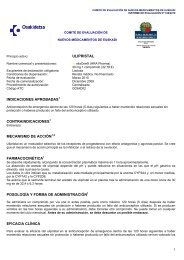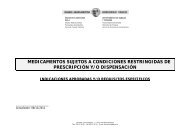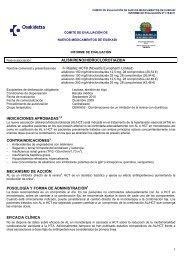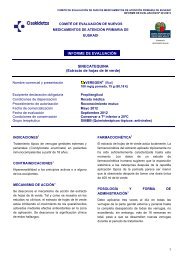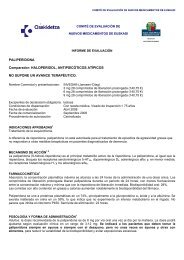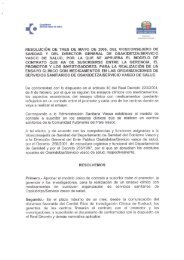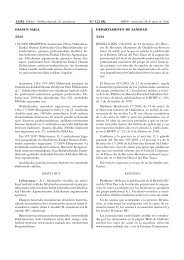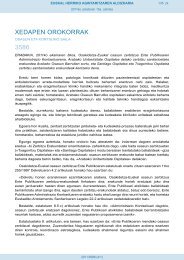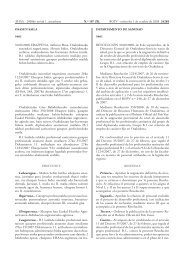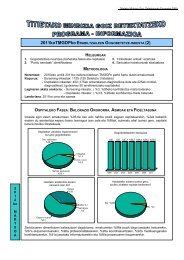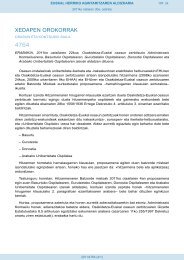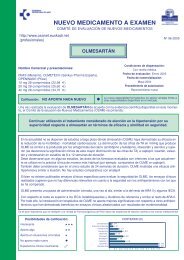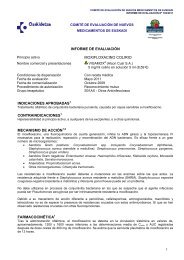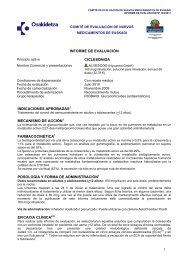Necesidades en cuidados paliativos de las enfermedades no ...
Necesidades en cuidados paliativos de las enfermedades no ...
Necesidades en cuidados paliativos de las enfermedades no ...
You also want an ePaper? Increase the reach of your titles
YUMPU automatically turns print PDFs into web optimized ePapers that Google loves.
Methodology<br />
This involved qualitative research carried out in two differ<strong>en</strong>t geographical<br />
areas, the Basque Country and the Canary Islands, from the perspective<br />
of pati<strong>en</strong>ts, families and of health and social care professionals.<br />
A <strong>no</strong>n-oncological pathology <strong>en</strong>titled to palliative care was <strong>de</strong>fined as<br />
a chronic disease in an advanced state, other than cancer, the <strong>de</strong>velopm<strong>en</strong>t<br />
of which leads to a fatal outcome. Persons of un<strong>de</strong>r 18 years of age were<br />
exclu<strong>de</strong>d.<br />
Eco<strong>no</strong>mic analysis: YES NO Experts Opinion: YES NO<br />
Results<br />
Social and health professionals consi<strong>de</strong>red that care at the <strong>en</strong>d of the<br />
lives of persons with <strong>no</strong>n-oncological pathologies should be based on the<br />
same care as that received in the case of cancer. The main barriers id<strong>en</strong>tified<br />
were the difficulties involved in diag<strong>no</strong>sing the final stage of life, the ori<strong>en</strong>tation<br />
of the health system towards short-term pathologies, the lack of training<br />
in palliative care and communication skills and the shortage of resources.<br />
Carers pointed out that they were largely self-taught in their work and<br />
that care impacts on their health. Continuous <strong>de</strong>cision-making repres<strong>en</strong>ts<br />
one of the main burd<strong>en</strong>s. They expressed a positive appraisal of the humane<br />
treatm<strong>en</strong>t provi<strong>de</strong>d by professionals and through home help. The main barrier<br />
id<strong>en</strong>tified was the difficulty <strong>en</strong>countered in accessing the differ<strong>en</strong>t services.<br />
Pati<strong>en</strong>ts take advantage of the long period that elapses betwe<strong>en</strong> the<br />
appearance of the symptoms and the diag<strong>no</strong>sis in or<strong>de</strong>r to adapt to their illness.<br />
They perceive their restricted auto<strong>no</strong>my as a burd<strong>en</strong> for their families<br />
and id<strong>en</strong>tify a lack of communication skills among medics and a lack of home<br />
care resources. Respect is consi<strong>de</strong>red to be a <strong>de</strong>termining factor of good care<br />
and they appreciated especially the work of nursing staff.<br />
Conclusions and Recomm<strong>en</strong>dations<br />
These results are coher<strong>en</strong>t with those obtained in previous research, but<br />
they are <strong>no</strong>t applicable to persons un<strong>de</strong>r 18 years of age.<br />
In or<strong>de</strong>r to improve the palliative care of <strong>no</strong>n-oncological diseases, it is<br />
necessary to modify the <strong>de</strong>finition of the final stage of life and to apply this<br />
earlier, simultaneously with the curative therapy. Health services must be<br />
reori<strong>en</strong>ted towards the care of chronic diseases and towards an increase in<br />
home help.<br />
24 NECESIDADES EN CUIDADOS PALIATIVOS DE LAS ENFERMEDADES NO ONCOLÓGICAS



